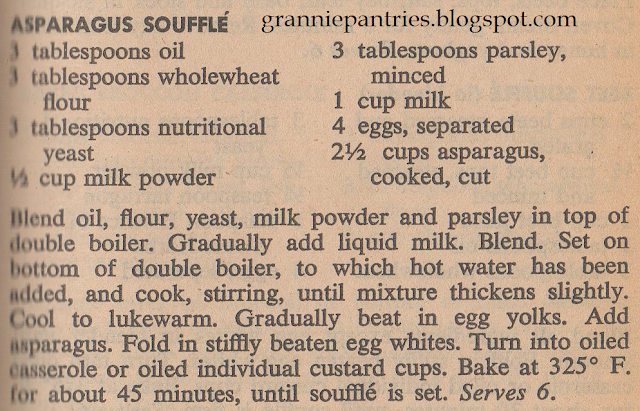It's asparagus season. My favorite asparagus is the slightly smoky grilled stalks on the Whole Foods salad bar. Prep requires nothing more than an ability to use salad tongs to transfer them to a container and a willingness to imagine that fellow salad bar users are relatively sanitary and sane.
For those who may not be willing to put quite that much faith in humanity (and I can't blame you!), recipes to prepare asparagus at home might be the better way to go. The Natural Foods Cookbook (Beatrice Trum Hunter, copyright 1961, but mine is from a 1975 printing) offers a couple of options. If you want your asparagus light and springy (in both the metaphorical and physical senses), there's an Asparagus Soufflé.
I'm not sure how ethereal this will be given that it is made with those old health-food standbys, whole wheat flour and powdered milk. Still, it sounds much more exciting than the asparagus option right below it.
Even if you're willing accept the premise that asparagus is appropriate for loafification, I doubt all the wheat germ, soy grits, and milk powder will do much to accentuate the fresh spring taste of tender stalks of asparagus. I imagine it as being more like a brick, made barely edible by the addition of the asparagus.
Kind of makes trusting other salad bar patrons seem like a more palatable option than doing one's own cooking, doesn't it?


"Natural foods" seems to be code for taking perfectly good food and making it as bland and heavy as possible. Bonus points if you can add chalky to the description.
ReplyDeleteI wonder if exposure to food from old health food cookbooks is part of the reason a lot of people still think that anything labeled healthy will taste terrible.
DeleteI think that the fat free craze of the 90s extended that association far beyond old health food cookbooks. I wonder if those women decided to stop chasing the cookie man for his cookies and started chasing him to beat him up over crappy cookies.
DeleteGood point.
DeleteThe whole wheat flour in that souffle is cracking me up. Even three spoons of white flour is a hard no in this book.
ReplyDeleteYes! I certainly understand the value of using whole grains when possible, but even a tiny amount of white flour is not allowed in a recipe where it would be more appropriate. But I guess we shouldn't be surprised since the roux starts out with oil instead of butter.
Delete